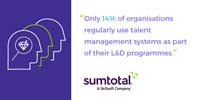2016 in Retrospect: The State of HR
 London (UK), December 2016 - As we look towards the fast-approaching New Year, SumTotal, a leading provider of unified HCM solutions proven to drive organizational performance, took the opportunity to ask 100 customers in Germany and the UK about the HR challenges they’ve faced this year. The survey results found that 38% of respondents considered a lack of insight into the existing skills within their business to be the biggest challenge when upskilling their workforce. Another big finding was related to the question of data: 60% of those asked stated they needed data to confidently understand the L&D needs across the business.
London (UK), December 2016 - As we look towards the fast-approaching New Year, SumTotal, a leading provider of unified HCM solutions proven to drive organizational performance, took the opportunity to ask 100 customers in Germany and the UK about the HR challenges they’ve faced this year. The survey results found that 38% of respondents considered a lack of insight into the existing skills within their business to be the biggest challenge when upskilling their workforce. Another big finding was related to the question of data: 60% of those asked stated they needed data to confidently understand the L&D needs across the business.
The majority of companies regard leadership development and the establishment of a talent pipeline to be absolutely necessary to be able to be successful in the future. But they implement the required learning and development measures inconsistently and too rarely.
A key area to be improved is the sourcing of skill sets, with only 44% of respondents frequently sourcing skill sets internally. "It was clear where priorities lay, with 83% of those asked stating that leadership and building leadership pipelines were key priorities for their business," said Liam Butler, VP, SumTotal Systems Corporate Sales in the EMEA region. "One of the most wide-ranging responses came from when we asked how frequently employee performance data is monitored. Some 28% answered annually, with only 10% saying they monitored it on a monthly basis. It’s clear then that the topics of leadership, data analysis, and greater insight will be on the top list of HR to-do lists for 2017."
Key survey results
- Only about 14% of the companies surveyed are using talent-management data on a regular basis to inform their L&D programs. Nonetheless, about 55 percent of the respondents based in UK and nearly 90% of the German companies surveyed assume that they understand the L&D needs across their business without utilizing concrete data.
- Building a talent pipeline is a key priority for all UK enterprises surveyed. In contrast, in Germany only 70% of the organizations agree, as some of them don’t have a long-term strategy for talent development in place yet.
- Only about 10% percent of the UK-based companies monitor employee-performance data monthly; 28% monitor it annually. In Germany monitoring employee performance data monthly is done quarterly by 23% of the companies surveyed and annually by 53%.
- The lack of insight into the existing skills in the business is the key challenge for British organizations in upskilling their workforce. In Germany companies consider the changing job roles as the main obstacle.
- For most of the companies, the future of the workplace was by far the most interesting topic at the HR Tech World Congress in Paris this year. Considering new methods, technologies, and market changes, the respondents have recognized the importance of continuous employee L&D.
- About 70% of the respondents from the UK think that, when searching for special skill sets, these can largely be sourced internally. In Germany, 90% of the companies surveyed take this view. This makes increased support and further professionalization of L&D highly advisable. This way not only the costs for the recruitment of new employees can be minimized, but existing employees will be more motivated to address new challenges. Their job satisfaction and thereby their loyalty towards the company will increase.
The results of the survey allow us to conclude that although the majority of companies questioned assume that they have the necessary overview, they rely all too often on their “gut instincts” instead of on reliable facts.
The employees of a company and their talents and abilities represent a decisive factor in its economic success. At the same time, the employees also represent the highest proportion of many companies’ operational costs. In the light of pressure on budgets, it is therefore not only important to know how much a company spends on training measures per employee, but also to be able to measure the effect of these training applications.
Companies can quantify the effectiveness of each individual programme with specific measurement procedures. Changes in the performance of employees, the economic implications of training measures, and the feedback of the learners, as well as their dedication at work will be collated. The talent-management programme can be continually refined using these analyses.
Through a centralised, integrated, and correctly deployed talent-management solution, personnel departments can tangibly bring their staff-related decisions in line with company goals and make a strategic contribution. The results of the survey show that until now, too few companies have used this opportunity.








